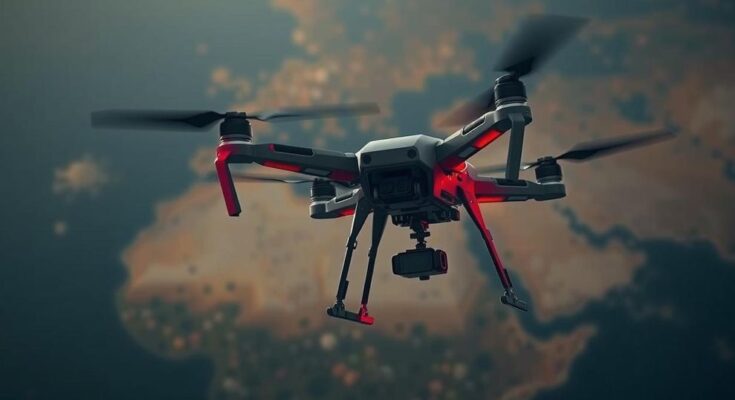Iranian and UAE-supplied drones have escalated the conflict in Sudan, allowing both SAF and RSF to target each other and civilians. The foreign intervention has led to significant casualties, breaches of UN embargoes, and a complex humanitarian crisis, raising serious concerns over prolonged warfare. Experts highlight the critical role of external support in determining the conflict’s dynamics and emphasize the urgent need for resolution efforts.
Since January, regular flights of Iranian cargo aircraft at Port Sudan Airport have augmented the conflict between Sudan’s ruling junta, led by General Abdel Fattah al-Burhan of the Sudanese Armed Forces (SAF), and the opposing Rapid Support Forces (RSF). The SAF, equipped with Iranian-made Mohajer-6 unmanned aerial vehicles (UAVs), has intensified its military operations against the RSF. Concurrently, the RSF receives supplies, including fuel and weaponry, from the United Arab Emirates (UAE) and mercenary groups like Africa Corps, showcasing a significant foreign intervention in Sudan’s internal strife.
The warfare has evolved with drones playing a pivotal role, representing the military might leveraged by both factions. The influx of UAVs from foreign nations explicitly breaches a United Nations arms embargo imposed on Sudan. A United Nations report highlighted the UAE’s clandestine operations in providing aid to the RSF, often masquerading as humanitarian assistance for displaced individuals in Chad.
Meanwhile, Africa Corps, an offshoot of the Wagner Group, has facilitated arms smuggling to the RSF from Syria and eastern Libya. While Russia openly supports the SAF in its aspirations for a strategic foothold along Sudan’s Red Sea coast, the UAE’s pursuit of a similar objective has led it to furnish drones to various allied forces across conflict regions, including Ethiopia and Yemen.
The RSF has exploited these drones not only to target SAF positions but also civilian infrastructures, exemplified by assaults on hospitals and marketplaces, resulting in unnecessary loss of life. The introduction of Iranian UAVs has fortified the SAF’s stance, allowing it to reclaim significant territories, including the state broadcaster in Omdurman, Sudan’s largest city.
Since the onset of hostilities in April 2023, the death toll has soared beyond 15,000, with millions displaced. Reports indicate that children and pregnant women suffer immensely in North Darfur, where the medical infrastructure has been severely compromised due to persistent attacks on health facilities. Experts assert that the continuous flow of drones into the conflict is likely to exacerbate the situation, hampering efforts for a peaceful resolution amidst international calls to cease hostilities. Despite the pressing need for dialogue, the SAF has resisted re-engagement in peace negotiations in Jeddah, Saudi Arabia.
Hamid Khalafallah, a Sudan expert and researcher, emphasized the significant influence of the UAE’s involvement stating, “If the UAE withdraws its support and cuts ties with the RSF today, there is an 80 per cent chance the war might end tomorrow.”
The ongoing conflict in Sudan is marked by a power struggle between the militarized factions of SAF and RSF, vying for control over the country’s abundant natural resources. This contest has been intensified by the intervention of foreign powers, notably Iran and the UAE, who supply arms and resources to their respective allies within Sudan. Drones have emerged as key tools in this conflict, vastly altering the dynamics of warfare and contributing to a significant increase in casualties and widespread humanitarian crises. The involvement of external actors complicates the situation further, raising questions regarding the enforcement of international arms embargoes and the viability of peace negotiations.
In summary, the provision of UAVs and military support from Iran and the UAE significantly prolongs the conflict in Sudan, intensifying the violence between the SAF and RSF. Foreign interference, reflected in the deployment of drones, not only violates international arms treaties but has also contributed to devastating humanitarian outcomes. Without decisive action from the international community to curb these foreign investments in the conflict, the prospects for a peaceful resolution remain grim, with continuing risks to civilian lives and infrastructural integrity. Additionally, the insights from experts stress the urgent need to reassess support strategies, as the withdrawal of external backing could notably alter the conflict’s trajectory.
Original Source: www.defenceweb.co.za




